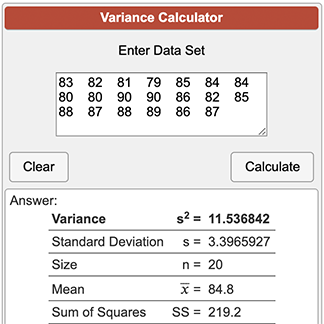Mathstudent7
New member
- Joined
- Aug 17, 2020
- Messages
- 14
According to my textbook if all possible samples for a given sample size are taken exactly once, the mean of the sample means will equal the population mean and the variance of the sample means will equal the variance of the population divided by n.
Assume we have an extremely small population consisting of just 4 individuals, with following variable values:
14, 7, 6, 3
The population mean is 7.5 and The population variance is 16.25
Assume we take a sample of size 2, i.e. n = 2
If we take every possible sample (14-7, 14-6, 14-3, 7-6, 7-3, 6-3) we get the following sample means
10.5
10
8.5
6.5
5
4.5
According to my textbook the mean of the sample means should be 7.5, which holds true.
However, the variance of the sample means is not equal to the variance of the population divided by n.
The variance of the sample means is 5.416666667 while the value should be 16.25/2 according to my textbook. Why this difference?
Assume we have an extremely small population consisting of just 4 individuals, with following variable values:
14, 7, 6, 3
The population mean is 7.5 and The population variance is 16.25
Assume we take a sample of size 2, i.e. n = 2
If we take every possible sample (14-7, 14-6, 14-3, 7-6, 7-3, 6-3) we get the following sample means
10.5
10
8.5
6.5
5
4.5
According to my textbook the mean of the sample means should be 7.5, which holds true.
However, the variance of the sample means is not equal to the variance of the population divided by n.
The variance of the sample means is 5.416666667 while the value should be 16.25/2 according to my textbook. Why this difference?

